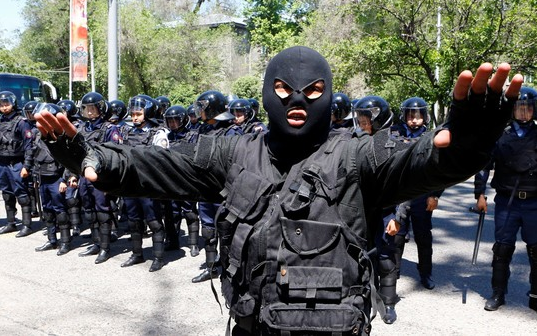 The president of Kazakhstan has warned that foreign forces are trying to destabilise the central Asian state, in his first public comments since a shootout between police and gunmen left more than a dozen dead in the western city of Aktobe on Sunday.
The president of Kazakhstan has warned that foreign forces are trying to destabilise the central Asian state, in his first public comments since a shootout between police and gunmen left more than a dozen dead in the western city of Aktobe on Sunday.
Nursultan Nazarbayev, who has ruled oil-rich Kazakhstan for a quarter century, described the attack in Aktobe as “an act of terrorism organised by adherents of radical pseudo-religious movements, who had received instructions from abroad”.
He also implied a link between the attack and a wave of peaceful protests that has broken out across the country in the past six weeks, drawing a parallel with the “colour revolutions” that toppled leaders in Georgia, Kyrgyzstan and Ukraine.
“We all know that so-called ‘colour revolutions’ can be carried out by various methods and begin with contrived protests, murders, and an attempt to seize power,” he said. “These symptoms are also being seen here.”
The comments suggest the recent instability is unnerving the Kazakh authorities, who have enjoyed decades of political stability on the back of rising prosperity and high oil prices.
But Kazakhstan’s economy is set to record its weakest growth this year since the 1990s, triggering the widespread dissatisfaction with the government that has underpinned the recent protests.
“Nazarbayev’s mantra has always been that Kazakhstan would be a beacon of stability in a restive region,” said Kate Mallinson, partner at risk consultancy GPW. “He can no longer say that. Kazakhstan has never seemed so vulnerable or exposed.”
Notwithstanding Mr Nazarbayev’s comments, which implied a connection with Islamist extremists, the motivation for the attack in Aktobe remains unclear.
According to the Kazakh security services, about two dozen men attacked two gun shops before attempting to storm a military base. The attack left at least 19 dead — 13 gunmen, three servicemen and three civilians. No group has claimed responsibility for the attack.
Mr Nazarbayev’s suggestion of a foreign hand in the instability chimes with Russian claims that the west has supported protest movements in other former Soviet republics. The Russian defence minister flew to Astana on Wednesday and announced that Moscow had given Kazakhstan air missile defence systems for free.
But analysts say the greater risk to Kazakhstan is its weak economy and lack of political reform.
“Nazarbayev is trying to distract the population’s attention from the myriad of domestic political and economic factors that resulted in the most significant protests and bloodiest attacks that Kazakhstan has witnessed since independence,” said Ms Mallinson.
The unrest comes as Kazakhstan’s political and business elites manoeuvre for influence ahead of a possible presidential succession as Mr Nazarbayev approaches his 76th birthday.
The Kazakh authorities on Monday accused Tokhtar Tuleshov, a local businessman who has been under arrest since January, of plotting a coup.
The government could now use the perceived threat against it as a pretext to tighten its control over the country and crack down on activists. Mr Nazarbayev said the government would “take the strongest possible measures to suppress extremists and terrorists”.
www.ft.com, 08.06.2016




